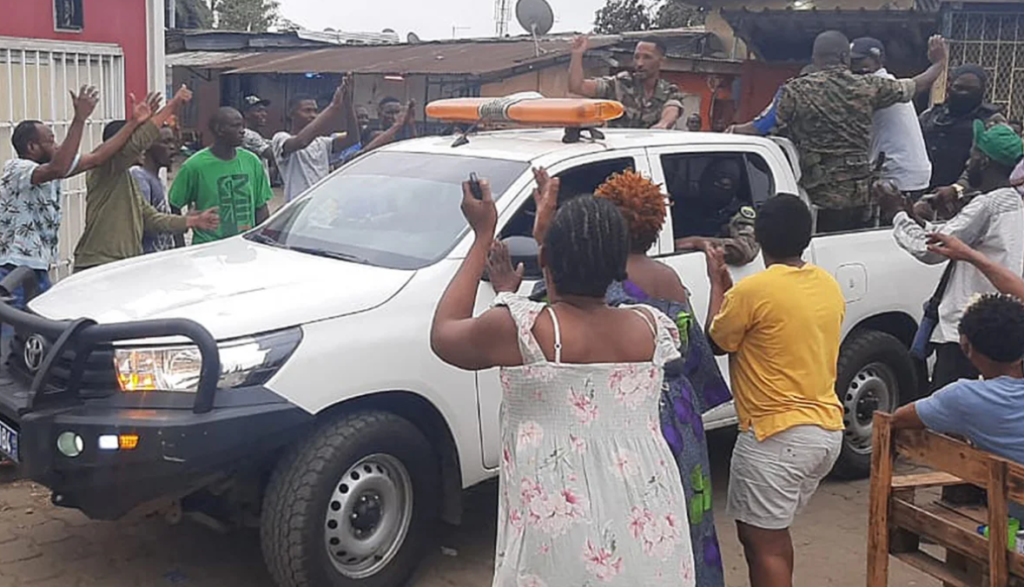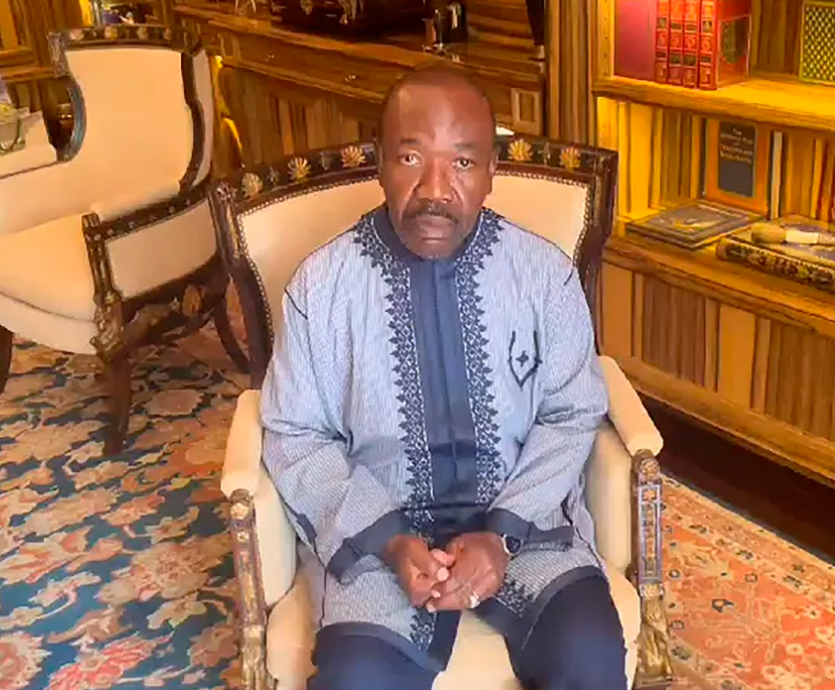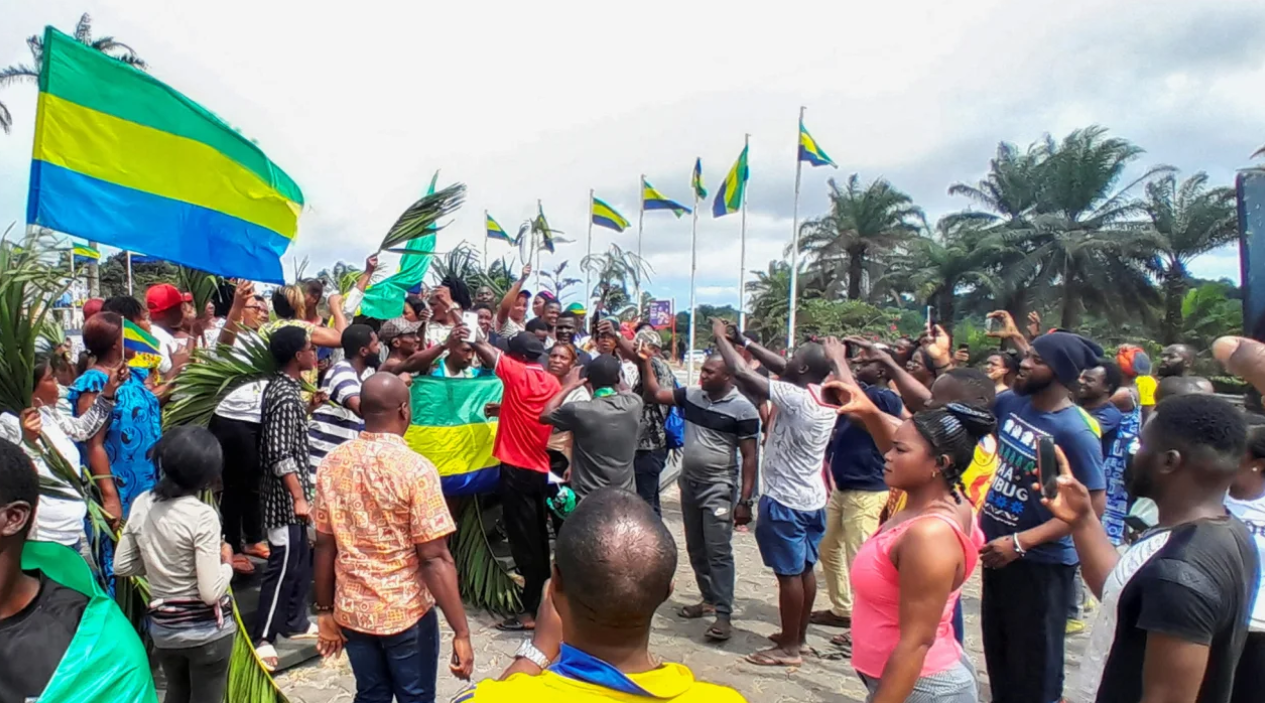Military officers.
Military officers in Gabon declared they were seizing power from President Ali Bongo Ondimba in a stunning coup on Wednesday, threatening the family’s half-century rule over the central African nation.
Men in army uniform appeared on national television to announce the president’s house arrest during the military takeover, prompting celebrations and reports of gunfire on the streets of the capital – but condemnation overseas.
“It is brought to the attention of the national and international community that Ali Bongo Ondimba is being kept under house arrest,” an unnamed junta spokesperson said on state TV on Wednesday morning.

The ousted president is surrounded by his “family and doctors,” the spokesperson added.
Hours later, the junta’s spokesperson said authorities will investigate charges against the president’s son, Nourredin Bongo Valentin, who was arrested alongside six other individuals for “high treason.”
The Agence France-Presse (AFP) news agency aired a video of the president asking his “friends” to “make noise,” following his house arrest.
My son is somewhere, my wife is another place,” he said.
“I am at the residence,” Bongo added, seated in what looks like a library. “Nothing is happening, I don’t know what’s going on.”
It was not immediately clear under what circumstances the film had been made.
Meanwhile, AFP showed video footage of soldiers in the capital Libreville celebrating in support of coup leader general Brice Oligui Nguema. He was seen on the shoulders of army personnel, who were shouting “president.”
Oligui told French newspaper Le Monde that military generals would meet on Wednesday to elect a leader for the transition of power, adding that he has not “yet” declared himself the new head of state in Gabon.
He said President Ali Bongo Ondimba, also known as Ali Bongo, has been “retired” and is enjoying “all his rights” as a “normal Gabonese” citizen. He refused to confirm if the president is under house arrest, following the announcement from the junta spokesperson. Ali Bongo, was earlier deemed the victor of a contested election.
The officers, claiming to represent “defense and security forces” in the country, made the announcement in a televised address on news channel Gabon24. It was viewed by CNN on X, formerly known as Twitter.
“On behalf of the Gabonese people and guarantor of the protection of institutions, CTRI [the Committee for the Transition and Restoration of Institutions] has decided to defend peace by putting an end to the regime in place,” a military officer said on the broadcast.
CNN cannot independently confirm the video, and has yet to reach Gabon’ government for comment.
In the broadcast, the military officer said the election results would be voided and the country’s borders would be shut. The officer added that all institutions in the country had been shut down, calling on Gabonese people to “remain calm.”
Loud sounds of gunfire could be heard in the capital Libreville, a Reuters reporter said, following the television appearance.
People in Gabon were seen dancing and celebrating on the streets of its capital, according to videos shared with CNN and posted on social media.
In one video obtained by CNN, people can be seen shouting “liberated!” and waving the Gabon flag in the Nzeng Ayong district of the capital, alongside military vehicles.
Criticism started to come in from around the world. France condemned the “military coup d’etat that is underway in Gabon,” government spokesperson Olivier Veran told journalists Wednesday.
The US Embassy advised its citizens in the capital to shelter, while the French foreign ministry urged its citizens in Gabon to “avoid or limit” travel.
There have been nine coups in the past three years in former French colonies – Mali, Guinea, Burkina Faso, Chad, Niger, Tunisia and now Gabon – that have undermined democratic progress in recent years.
Bongo’s long rule
Earlier Wednesday, Gabon’s election body said Bongo had won the presidential election with 64.27% of the vote, Reuters reported, after a delay-plagued general election that the opposition denounced as fraudulent.

Bongo’s main challenger, Albert Ondo Ossa, came in second place with 30.77%, said the election body. Bongo’s team had rejected Ondo Ossa’s allegations of electoral irregularities.
Ali Bongo, 64, took over from his father, Omar Bongo, who died of cardiac arrest while receiving treatment for intestinal cancer in a Spanish clinic in 2009, following nearly 42 years in office.
The elder Bongo came into power in 1967, seven years after the country’s independence from France.
He ruled over the small nation with an iron fist, imposing a one-party system for years and only allowing multi-party rule in 1991, though his party retained its grip on government.
Ali Bongo began his political career in 1981, serving as foreign minister and congressman from 1989 to 1991, according to the Gabonese embassy website in the US. He was defense minister from 1999, before becoming president in 2009.
